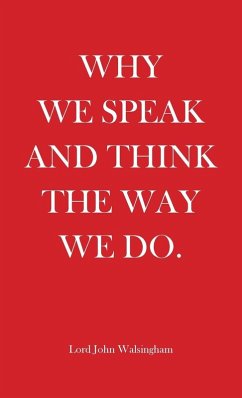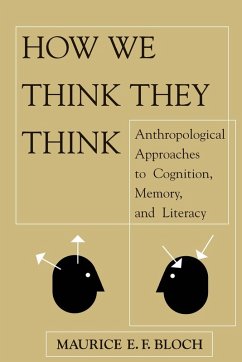
Why We Speak and Think the Way We Do
Versandkostenfrei!
Versandfertig in 1-2 Wochen
18,99 €
inkl. MwSt.

PAYBACK Punkte
9 °P sammeln!
This book is a follow on from my "On the Origins of Speaking", the 2021 second edition, half the length of the 2005 original. Now I draw attention to the way our first proto-language with no words but only seventeen meaningful phonemes or single sounds, established at least 400,000 years ago when we were still only hominids, Homo Erectus, determines the way we speak and think today. Before we spoke we hardly thought consciously, only unconsciously and instinctively like a dog does, because thinking consciously requires a word or at least a phoneme as an icon to formulate each thought. Scientif...
This book is a follow on from my "On the Origins of Speaking", the 2021 second edition, half the length of the 2005 original. Now I draw attention to the way our first proto-language with no words but only seventeen meaningful phonemes or single sounds, established at least 400,000 years ago when we were still only hominids, Homo Erectus, determines the way we speak and think today. Before we spoke we hardly thought consciously, only unconsciously and instinctively like a dog does, because thinking consciously requires a word or at least a phoneme as an icon to formulate each thought. Scientific American published an article in May 2025 suggesting it was possible to think without any icons, but this is not the case. We all think in words (or other verbal icons). People tend to think we have a mind and even that it may be found in the brain, but actually a mind is merely an abstract term for all an individual's thinking, and has no entity or existence and as an activity of the brain is not to be found in it, any more than the mileage of a motor car is to be found inside the motor, or indeed the activity of a horse inside the horse. To get everyone to adopt the same meaning for each phoneme when we had no speech to discuss the matter we adopted ideological thinking, and politically this is now the elephant in the room.












